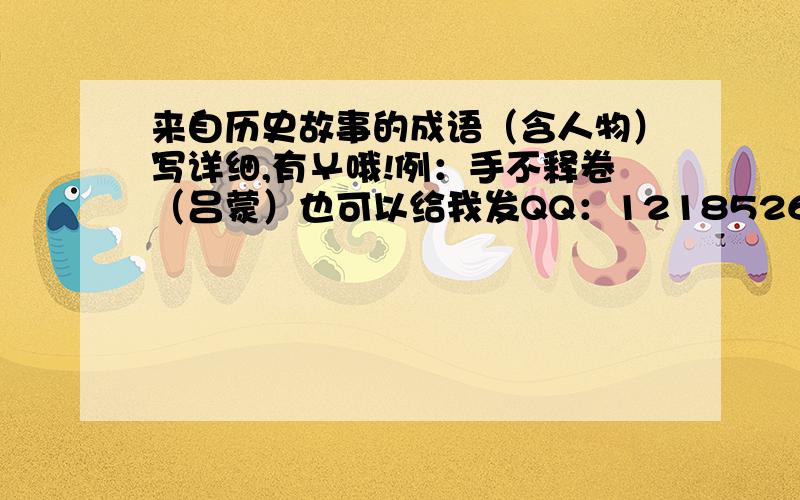来自历史故事的成语(含人物)写详细,有¥哦!例:手不释卷(吕蒙)也可以给我发QQ:121852662(在QQ留言上写‘百度知识’,我就加你)!
来源:学生作业帮助网 编辑:作业帮 时间:2024/04/27 23:19:51

来自历史故事的成语(含人物)写详细,有¥哦!例:手不释卷(吕蒙)也可以给我发QQ:121852662(在QQ留言上写‘百度知识’,我就加你)!
来自历史故事的成语(含人物)
写详细,有¥哦!
例:手不释卷(吕蒙)
也可以给我发QQ:121852662(在QQ留言上写‘百度知识’,我就加你)!
来自历史故事的成语(含人物)写详细,有¥哦!例:手不释卷(吕蒙)也可以给我发QQ:121852662(在QQ留言上写‘百度知识’,我就加你)!
黄袍加身(赵匡胤)
解释: 释:放下;卷:指书籍。书本不离手。形容勤奋好学。
出处: 《三国志·吴书·吕蒙传》注引《江表传》:“光武当兵马之务,手不释卷。”
示例: 闵象南老好观书,年七十余,每夜漏下二三十筹,~。(清·王晫《今世说·德行》)
近义词: 学而不厌、爱不释手
反义词: 不学无术
用法: 主谓式;作谓语、宾语、状语;含褒义
英文: very di...
全部展开
解释: 释:放下;卷:指书籍。书本不离手。形容勤奋好学。
出处: 《三国志·吴书·吕蒙传》注引《江表传》:“光武当兵马之务,手不释卷。”
示例: 闵象南老好观书,年七十余,每夜漏下二三十筹,~。(清·王晫《今世说·德行》)
近义词: 学而不厌、爱不释手
反义词: 不学无术
用法: 主谓式;作谓语、宾语、状语;含褒义
英文: very diligent
故事: 三国时期吴国大将吕蒙没有文化知识,孙权鼓励他学习史书与兵法。吕蒙总是推说军队事多没有时间学习,孙权列举自己及前人的例子,如“光武当兵马之务,手不释卷,孟德亦谓老而好学。”吕蒙深受感动,从此发愤学习,学问提高很快
常用度: 高
收起
退避三舍 tuì bì sān shě
English
春秋时候,晋献公听信谗言,杀了太子申生,又派人捉拿申生的弟弟重耳。重耳闻讯,逃出了晋国,在外流忘十几年。
经过千幸万苦,重耳来到楚国。楚成王认为重耳日后必有大作为,就以国群之礼相迎,待他如上宾。
一天,楚王设宴招待重耳,两人饮洒叙话,气氛十分融洽。忽然楚王问重耳:“你若有一天回晋国当...
全部展开
退避三舍 tuì bì sān shě
English
春秋时候,晋献公听信谗言,杀了太子申生,又派人捉拿申生的弟弟重耳。重耳闻讯,逃出了晋国,在外流忘十几年。
经过千幸万苦,重耳来到楚国。楚成王认为重耳日后必有大作为,就以国群之礼相迎,待他如上宾。
一天,楚王设宴招待重耳,两人饮洒叙话,气氛十分融洽。忽然楚王问重耳:“你若有一天回晋国当上国君,该怎么报答我呢?”重耳略一思索说:“美女待从、珍宝丝绸,大王您有的是,珍禽羽毛,象牙兽皮,更是楚地的盛产,晋国哪有什么珍奇物品献给大王呢?”楚王说:“公子过谦了。话虽然这么说,可总该对我有所表示吧?”重耳笑笑回答道:“要是托您的福。果真能回国当政的话,我愿与贵国友好。假如有一天,晋楚国之间发生战争,我一定命令军队先退避三舍(一舍等于三十里),如果还不能得到您的原谅,我再与您交战。”
四年后,重耳真的回到晋国当了国君,就是历史上有名的晋文公。晋国在他的治理下日益强大。
公元前633年,楚国和晋国的军队在作战时相遇。晋文公为了实现他许下的诺言,下令军队后退九十里,驻扎在城濮。楚军见晋军后退,以为对方害怕了,马上追击。晋军利用楚军骄傲轻敌的弱点,集中兵力,大破楚军,取得了城濮之战的胜利。
故事出自《左传·僖公二十二年》。成语“退避三舍”比喻不与人相争或主动让步。
Retreating about Thirty Miles as Condition For Peace
During the Spring and Autumn Period (770-476 B.C.), Duke Xian of the State of Jin Killed the crown prince Sheng because he had heard slanders about Sheng and believed them. He also sent his men to arrest Chong Er, Shen Sheng and believed them. He also sent his men to arrest Chonh Er, Shen Sheng's brother. Hearing the news, Chong Er escaped from the state of Jin, remaining a fugitive for more than ten years.
After innumerable hardships, Chong Er arrived at the State of Chu at last. King Cheng of the State of Chu treated him with high respect as he would have treated the ruler of a state, believing that he would have a vright fuure.
One day, King Cheng of the State of Chu gave a banquet in honoudr of Chong Er. Suddenly, amid the harmonious atmosphere of drinking and talking, King Cheng of the State of Chu asked Chong Er. "How will you repay me when you return to the State of Jin and become its ruler one day?" After thinking for a moment, Chong Er said, "You have plenty of beauties and attendants as well as jewelry and silk cloth, and the state of Chu abounds in rare brides and animals. What treasure can the State of Jin boast having to present to your majesty?" King Cheng of the State of Chu said, "You are too modest. Nevertheless, you still have to show your gratitude to me in one way or another, I presume?" Smiling, Chong Er answered, "If I should be fortunate enouge to return to the State of Jin and become its ruler, the State of Jin would be friendly to the State of Chu. If, one day, there should be a war between the two states, I would definitely order my troops to retreat three SHE (one SHE is equivalent to thirty LI. The LI is a Chinese unit of length equivalent to 1/2 kilometre. And, therefore, three SHE is about thirty miles.) as a condition for peace. If, under that condition, you were still not reconciled, I would have to fight with you."
Four years later, as might be expected, Chong Er returned to the State of Jin and became its ruler. He was none other than Duke Wen of the State of Jin famous in ancient Chinese history. Ruled by him, the State of Jin became increasingly powerful.
In the year 533 B.C., the Chu troops and the Jin troops confronted each other in a battle. Faithful to his promise, Duke Wen of the State of Jin ordered his troops to retreat about thirty miles. After retreating, the Jin troops were stationed at Chengpu. Seeing that the Jin troops were retreating, the Chu troops thought that the enemy troops were afraid, and began chasing them. Taking advantage of the Chu troops' arrogance and their talking the Jin troops lightly, the Jin troops concentrated their forces and inflicted a crushing defeat on the Chu troops, thus winning the victory of the battle of Chengpu.
This set phrase, "retreating about thirty miles as a condition for peace," is derived from the Chapter "The Twenty-second Year of Duke Xi" in ZuoZhuan, the famous commentary by Zuo Qiuming on The spring and Autumn Annals. The idea of this set phrase is to give way to somebody in order to avoid a conflict.
洛阳纸贵 luò yáng zhǐ guì
English
晋代文学家左思,小时候是个非常顽皮、不爱读书的孩子。父亲经常为这事发脾气,可是小左思仍然淘气得很,不肯好好学习。
有一天,左思的父亲与朋友们聊天,朋友们羡慕他有个聪明可爱的儿子。左思的父亲叹口气说:“快别提他了,小儿左思的学习,还不如我小时候,看来没有多大的出息了。”说着,脸上流露出失望的神色。这一切都被小左思看到听到了,他非常难过,觉得自己不好好念书确实很没出息。于是,暗暗下定决心,一定要刻苦学习。
日复一日,年复一年,左思渐渐长大了,由于他坚持不懈地发奋读书,终于成为一位学识渊博的人,文章也写得非常好。他用一年的时间写成了《齐都赋》,显示出他在文学方面的才华,为他成为杰出的文学家奠定了基础。这以后他又计划以三国时魏、蜀、吴首都的风土、人情、物产为内容,撰写《三都赋》。为了在内容、结构、语言诸方面都达到一定水平,他潜心研究,精心撰写,废寝忘食,用了整整十年,文学巨著《三都赋》终于写成了。
《三都赋》受到谅也评,人们把它和汉代文学杰作《两都赋》相比。由于当时还没有发明印刷术,喜爱《三都赋》的人只能争相抄阅,因为抄写的人太多,京城洛阳的纸张供不应求,一时间全城纸价大幅度上升。
故事出自《晋书·文苑·左思传》。成语“洛阳纸贵”,称颂杰出的作品风行一进。
草木皆兵 cǎo mù jēi bīng
English
东晋时代,秦王苻坚控制了北部中国。公元383年,苻坚率领步兵、骑兵90万,攻打江南的晋朝。晋军大将谢石、谢玄领兵8万前去抵抗。苻坚得知晋军兵力不足,就想以多胜少,抓住机会,迅速出击。
谁料,苻坚的先锋部队25万在寿春一带被晋军出奇击败,损失惨重,大将被杀,士兵死伤万余。秦军的锐气大挫,军心动摇,士兵惊恐万状,纷纷逃跑。此时,苻坚在寿春城上望见晋军队伍严整,士气高昂,再北望八公山,只见山上一草一木都像晋军的士兵一样。苻坚回过头对弟弟说:“这是多么强大的敌人啊!怎么能说晋军兵力不足呢?”他后悔自己过于轻敌了。
出师不利给苻坚心头蒙上了不祥的阴影,他令部队靠淝水北岸布阵,企图凭借地理优势扭转战局。这时晋军将领谢玄提出要求,要秦军稍往后退,让出一点地方,以便渡河作战。苻坚暗笑晋军将领不懂作战常识,想利用晋军忙于渡河难于作战之机,给它来个突然袭击,于是欣然接受了晋军的请求。
谁知,后退的军令一下,秦军如潮水一般溃不成军,而晋军则趁势渡河追击,把秦军杀得丢盔弃甲,尸横遍地。苻坚中箭而逃。
故事出自《晋书·苻坚·载记》。成语“草木皆兵”,形容神经过敏、疑神疑鬼的惊恐心理
收起